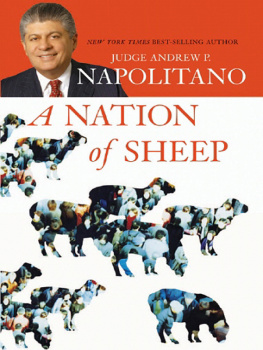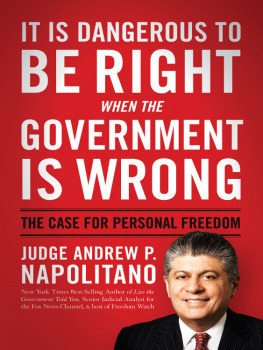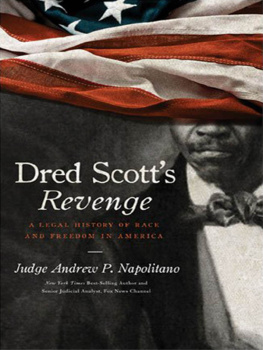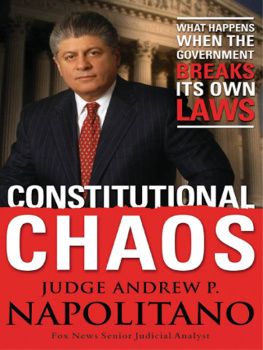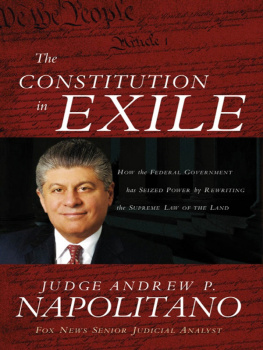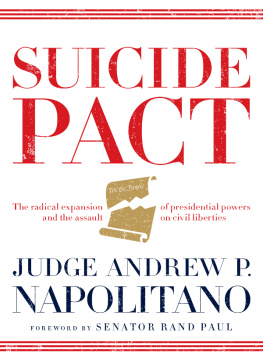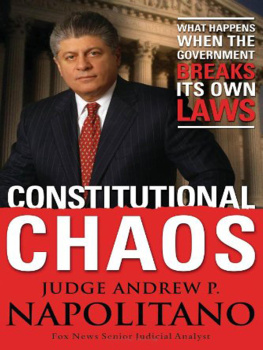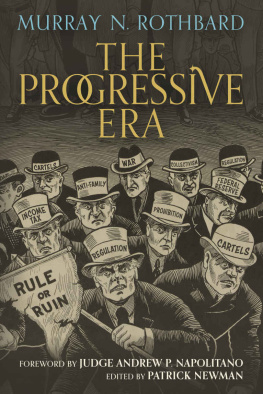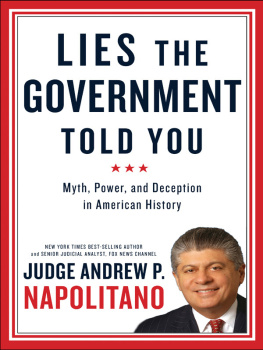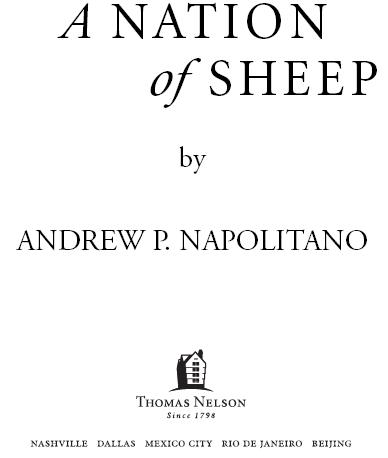
2007 by Andrew P. Napolitano
All rights reserved. No portion of this book may be reproduced, stored in a retrieval system, or transmitted in any form or by any meanselectronic, mechanical, photocopy, recording, scanning, or otherexcept for brief quotations in critical reviews or articles, without the prior written permission of the publisher.
Published in Nashville, Tennessee, by Thomas Nelson. Thomas Nelson is a trademark of Thomas Nelson, Inc.
Thomas Nelson, Inc. titles may be purchased in bulk for educational, business, fundraising, or sales promotional use. For information, please email SpecialMarkets@ThomasNelson.com.
Library of Congress Cataloging-in-Publication Data
Napolitano, Andrew P.
A nation of sheep / by Andrew P. Napolitano.
p. cm.
Includes bibliographical references and index.
ISBN 978-1-59555-097-2
1. Civil rightsUnited States. 2. Executive powerUnited StatesPopular works. 3. Constitutional historyUnited StatesPopular works. I. Title.
JC599.U5N26 2007
323.0973dc22
2007034871
Printed in the United States of America
07 08 09 10 QW 1 2 3 4 5 6
Dedicated to the memory
of
THOMAS HARDING JONES,
born on June 12th 1950,
died on July 31st 2007.
May the angels carry you,
my dear friend,
into Paradise.
ALSO BY ANDREW P. NAPOLITANO
Constitutional Chaos:
What Happens When Government Breaks Its Own Laws
The Constitution in Exile:
How the Federal Government Has Seized Power by
Rewriting the Supreme Law of the Land
CONTENTS
I would rather be exposed
to the inconveniences attending too much libertythan to those attending too small a degree of it.

The God who gave us life
gave us liberty at the same time:
the hand of force may destroy,
but cannot disjoin them.
THOMAS JEFFERSON

St. Thomas More: Some men think the Earth is round,
others think it flat...
But if it is flat, will the Kings command make it round?
And if it is round, will the Kings command flatten it?
No...

ROBERT BOLT,
A Man for All Seasons
Picture this: The Attorney General of the United States testifies under oath that the president is not ordering federal agents to read the mail, listen to the telephone calls, and monitor the computer keystrokes of ordinary Americans, without a warrant to do so from a judge. That would be criminal. But six months later, the president admits that he has done so.
Picture this: The Constitution prohibits Congress from abridging free speech. But suddenly, Congress has made it a crime to talk about receiving self-written search warrants from an FBI agent.
Picture this: The Constitution guarantees speedy, fair jury trials with defense counsel, but all of the sudden, Congress authorizes the president to dispense with those rights if the U.S. military has incarcerated you in Cuba.
And one more: The Constitution guarantees that the government can only force you to sell your house to it if it plans a public use of the property. But now the Supreme Court is telling the government it can sell your house to your neighbor, against your will.
These are not Hollywood movie plots but recent, unhappy history. They are just a few events in the sad history of liberty lost to an out-of-control government that we have sheepishly permitted to subvert our rights.
But, are not our rights guaranteed by the Constitution? Why doesnt anyone in government take seriously the oath to uphold the Constitution? Why does it seem that every time you listen to the president, he is asking for more power and authority from Congress to invade our privacy, stifle our speech, and shortcut prosecutions? Is there any limit on the powers that Congress can give the president, or that the president can just seize and exercise? Can the Supreme Court simply change well-regarded rules so as to allow the government to seize your house and sell it to your neighbor? Do we have any rights, as human beings or as Americans, that the government cannot take away, no matter what its goal may be?
These questions do not have simple or direct answers. But they are questions that all who love liberty should be asking. I have written this book to generate a debate about freedom; a debate, regrettably, that government does not want us to have. Now, why do I say that? Well, President Bush has argued that his job is to protect the homeland because our governments greatest responsibility is to protect the American people. Thats our most important job,and thus, all that he does toward that goal, in his view, is good and appropriate. Even when he silences opponents, strips innocents of their dignity, disregards federal criminal law, establishes military courts, unseen by Americans since the Civil War, and rejects the freedoms guaranteed in the Constitution, he claims he is doing his job. And his Administration has argued that there should be no debate about any of this, because debate itself helps the enemy and thus impairs the governments ability to protect the homeland.
But is protecting the homelandTeutonic as that soundsjust a matter of protecting human beings from physical harm? Or is there more to it than that? Should not the government also be responsible for protecting our values and the freedoms we are guaranteed in the United States Constitution? If you read the oath that every president has taken, as it is prescribed in the Constitution, you will quickly see what the Founding Fathers established as the presidents principal job: to uphold, preserve, protect, and defend the Constitution. Yet today, in an attempt to protect our lives, the Constitution is being violatedon a daily basis, it seemsas more and more of our freedoms are taken away. Among well-meaning persons, the governments primary responsibility is in dispute.
Heres anotherprofound question:How can governmentpossibly preservefreedom by taking itaway? Answer: Thegovernment is notinterested inpreserving freedom,and it has stated asmuch.
This disputeis the governments primary job to protect our lives or our freedoms?is more than academic. The answer to the question determines whether our freedoms are ours to keep, or the governments for the taking.
Heres another profound question: How can government possibly preserve freedom by taking it away? Answer: The government is not interested in preserving freedom, and it has stated as much. The president must presume that protection of our real estate ranks higher than protection of the Constitution, even though his oath is to uphold the latter. Notwithstanding the current presidents oath, registered in Heaven, as one of his notorious predecessors liked to say, the Bush Administration has systematically attacked and diminished virtually every freedom and right guaranteed by the Constitution: freedom of speech, freedom of the press, freedom of religion, freedom of association, the right to privacy, the right not to self-incriminate, the right to counsel, the right to speedy trials, the right to fair trials, the right to avoid cruel and unusual punishment, even the right to be set free after
Next page
